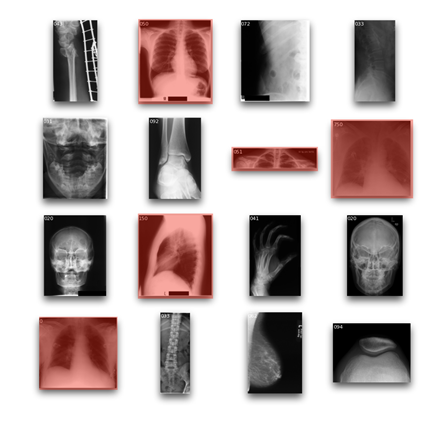DR-AI - Development of application-oriented analysis algorithms in the imaging disciplines of dermatology and radiology using Artificial Intelligence.
 Mockup: Alessandro Wollek, from the IRMA dataset
Copyright: Alessandro Wollek
License: Creative Commons Attribution (CC-BY)
Mockup: Alessandro Wollek, from the IRMA dataset
Copyright: Alessandro Wollek
License: Creative Commons Attribution (CC-BY)
The basic goal of the "DR-AI" project is to combine a variety of heterogeneous data sets to train machine learning (AI) algorithms so that the trained models can actually be used in medical practice and not just theoretically achieve good results. These models will be evaluated and tested directly in the specialties of radiology and dermatology within the clinics. In terms of content, the investigation in the specialty of dermatology concerns all clinically available data sets, primarily of the image recordings and medical history. In the field of radiology, the investigations refer to data sets of conventional X-ray thorax images, which are radiologically annotated with regard to relevant pathologies (including COVID-19 typical infiltrates).
Subproject
As part of the project, Prof. Alena Buyx's research group at the Institute for the History and Ethics of Medicine (IGEM) at the Technical University of Munich (TUM) is ensuring that the AI systems comply with current regulations and that social and ethical issues are taken into account during development in order to minimize potential risks as best as possible. To achieve this goal, the new approach will be embedded ethics used exploratively.
Various scientific contributions have shown that AI the moral agency (moral decision-making, moral freedom of choice, moral capacity to act?) poses major challenges and requires new approaches as well as new ethics. Recently, the demand that the measures corresponding to this be integrated into the various steps of technology development has gained increasing importance - this has embedded ethics coined as a new field of interest.
The approach embedded ethics has recently been proposed as a practical approach. Thus. refer to McLennan and Fiske et al. (2020) as the integration of. embedded ethics into technology development as the gold standard: According to this, an:e ethicist:in or a team of ethicists should be part of the development team. This goes hand in hand with the idea that embedded ethics "should be integrated into the development process from the outset to anticipate, identify, and address social and ethical issues that arise during the development process of an AI technology-including the planning, ethical approval, design, programming, testing, and implementation phases " (McLennan, Fiske, et al., 2020, para. 2, transl. d.A.). The overarching goal is to "provide transparency regarding existing uncertainty or inconsistency and bring a new perspective 'to the bench' by offering a variety of ethically defensible strategies" (McLennan, Fiske, et al., 2020, para. 2, transl. d.A.).
As a basis for the project, the ethical discourse specifically for AI-based health applications in radiology and dermatology is also presented in a structured way. This includes current debates in machine ethics, technology ethics, algorithm ethics, information ethics, and related fields, as well as paradigms in medical ethics. A two-phase peer-to-peer interview study with dermatologists, radiologists, and informaticians will be conducted to provide new insights into the implementation of embedded ethics The aim is to gain practical experience and to find out from employees which aspects they perceive as socially relevant when working on projects for AI-based health applications. The insights gained will be discussed in the consortium and will be incorporated into ongoing development work.
Theresa Willem
Tel.: +49 89 4140 4042
Mail: theresa.willem@tum.de
Ismaninger Street 22, 81675 Munich
Project Management:
Prof. Dr. med. Alena Buyx
Period:
01.10.2020-30.09.2023
Project Type:
Joint project
Funding source:
BMG - Federal Ministry of Health